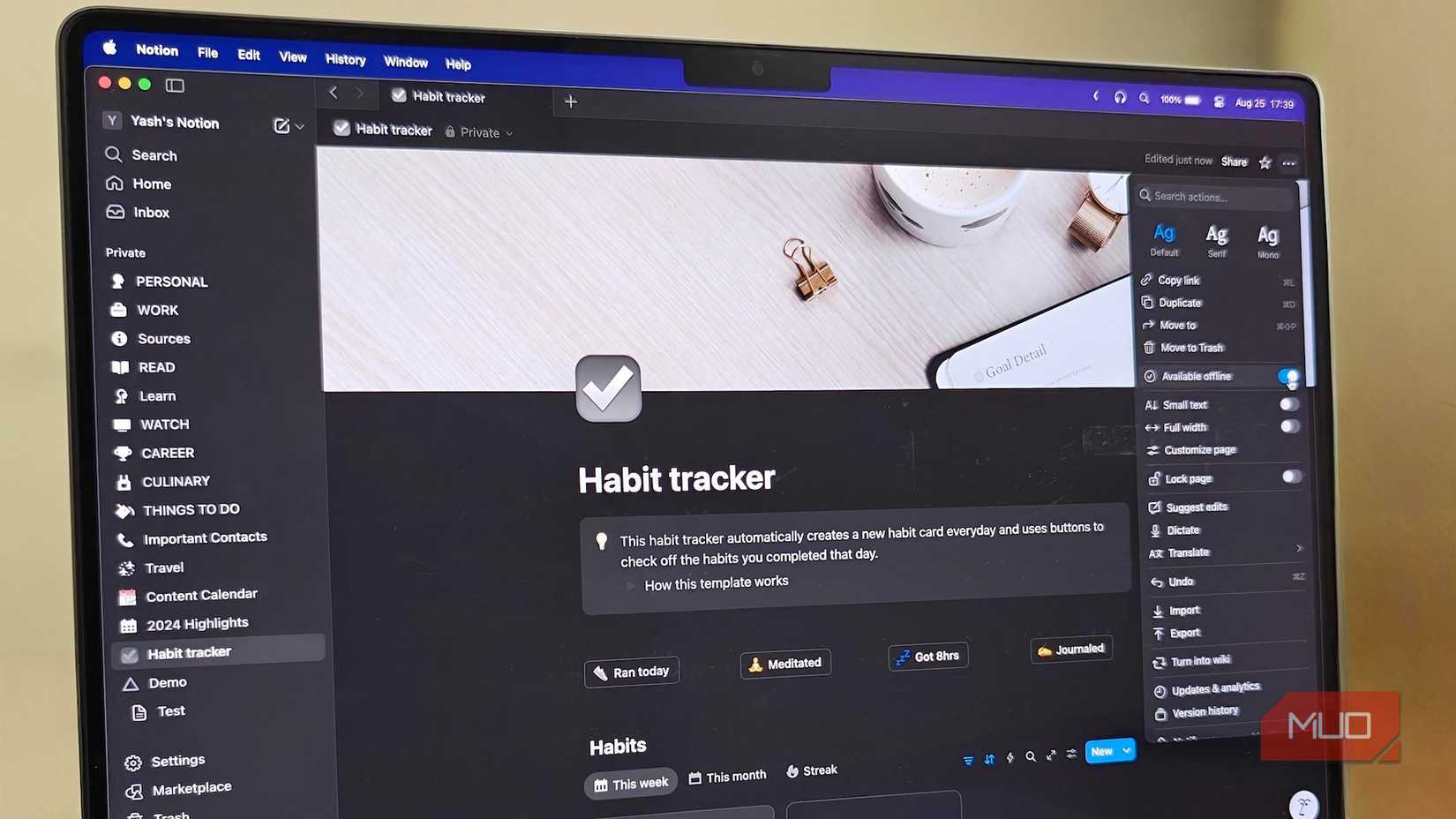Notion is an incredibly powerful tool for organizing your life. However, it’s not perfect, and it might not match everyone’s requirements—despite a long list of features.
I’ve tried running my entire life on Notion, but eventually, I found that I could only run in a specific way that Notion allowed. So now, I only use it for this one thing.
Why Notion didn’t work for me
Since I’ve always used multiple tools to track my life, both personal and professional, I was stoked by the idea of Notion bringing it all together. However, when I started moving to Notion, I quickly realized its limitations. Yes, Notion has a lot of features, but they aren’t exactly features I’ll be using every day. On the contrary, a lot of features that I’ve been used to in the years of using several specialized tracking programs were missing from Notion.
This is one of the biggest reasons why Notion didn’t work for me, but Excel did. I prefer organizing data in tables and spreadsheets. The closest equivalent that Notion had to offer was databases. However, the way Notion handles data, especially when it comes to tables and databases, isn’t quite as versatile as something like Microsoft Excel or even Google Sheets. Yes, you can use formulae in Notion, but you don’t get the freedom of picking data from any cell or cell range as you desire.
I couldn’t track my work and automate data updation tasks as effectively. There are workarounds that achieve this degree of flexibility in Notion, but they are too much work to set up. In the end, the convenience of specialized tools won me over, and I had to stop using Notion for everything.
Another major problem is that Notion workspaces quickly start getting out of hand the moment your project scales up. Simple tasks like adding a note can mean navigating through multiple database views. As I kept adding more and more pages in an attempt to “optimize” my Notion workflow, I realized I’m just sinking more time into solving problems rather than being productive. I built my workflow entirely in Notion only to regret it later.
Sharing my Notion or working with collaborators also turned out to be a challenge. I tend to keep very in-depth records of past work, which means the free 1,000 block limit on shared workspaces ran out quicker than I imagined. And although my Notion subscription ends up paying for itself every month, I still had to get one to be able to use it properly in the first place.
Once again, there are ways you can solve these problems. There are useful Notion widgets you can add, and it’s constantly adding new features, such as feed view, which totally changed how I plan my day. However, these widgets and features only sink you deeper in the Notion ecosystem. You’ll end up with a maze of pages, databases, and all sorts of different data structures, all set up in a rather clunky manner, which isn’t easy to navigate and very difficult to change.
Notion is a great data dump
After I was overwhelmed with the amount of data I had dumped in Notion, it finally struck me what it was best at—dumping data. As long as I could keep the page structure simple to navigate, Notion can act as the ultimate scratchpad.
Notion is also rather good at presenting data. So instead of trying to do everything natively in Notion, I track my tasks and goals on a Google Sheets document and embed it into my Notion page. This also works with Google Calendar, the primary calendar tool I use.
So I went back to my original systems—Google Sheets for tracking progress, Google Calendar for tracking appointments and engagements, Microsoft To-Do to quick to-do lists, and finally, Notion as the ultimate data dump. I can still see the most important information about my day and ongoing tasks all in one place, without giving up the flexibility of tracking progress however I want.
Notion also supports Markdown, making it very handy for quick notes and jotting down rough ideas. Instead of complicated databases and page structures, my Notion workspaces now contain individual pages for tracking different aspects of my life.
Each page contains a relevant Google Sheets or Calendar embed, a simple checklist for any tasks or to-do items, and a separate section for notes or jotting down ideas if required. Since all the information I want about a particular topic is on a single page, I no longer have to jump through pages to find a simple task.
This is great for when I get ideas in random places, like on the subway or while driving. I put them down in my Notion page allotted for that particular task, and set a reminder to get to them when I’m back at my desk.
Apart from supercharging my productivity, this approach ensures I get to give each idea the best treatment possible. It works for just about every thought as well. Anything from a new article idea to a revelation on how to fix that annoying bug in my code goes into my Notion workspace.
Notion may not be a one-size-fits-all solution when it comes to tracking tasks or organizing your life. However, it is such a good tool that once you start using it, you’ll always find that one situation where it’s the ultimate tool—and that’s the real value Notion offers.



